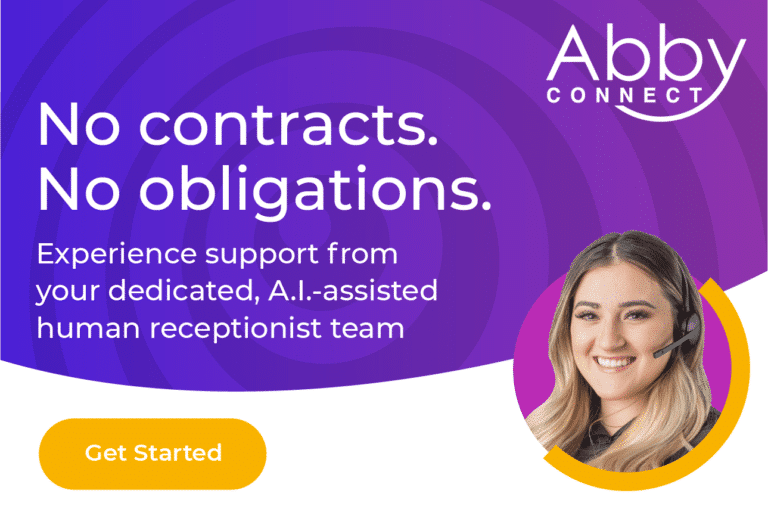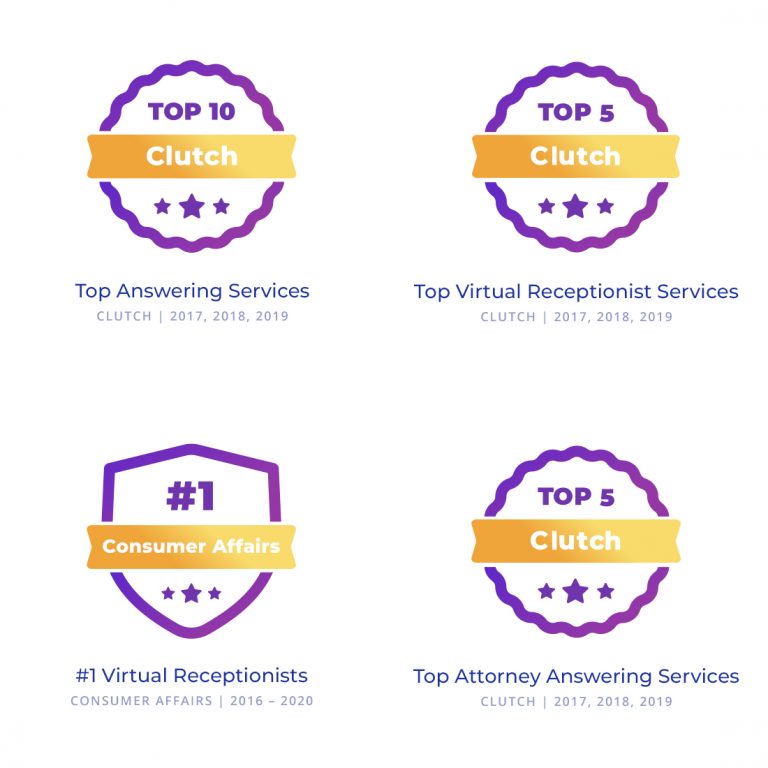
In businesses of days past, you may remember a busy lobby or office space populated by endlessly ringing phones. Today, communication and customer service are still vital parts of keeping any business afloat—but more and more, managing these tasks in-house has become as outdated as the rotary telephone.
Now, businesses are shifting to new technologies and services that free up valuable employee time, outsourcing many of those time-consuming communications tasks to a trained support team—often in the form of a virtual receptionist answering service or a call center.
If your business is often overwhelmed with calls, you might be thinking that a call center or answering service is just the ticket to help you boost customer satisfaction and improve communication. But how does a virtual receptionist answering service vs a call center differ, and can they retain the personal touch you’ve worked so hard to build with your customers?
In this article, we’re detailing the differences so you won’t be left on hold about your options.
Call Centers: A Communications Hub
Just like snail mail is no longer the most efficient or convenient way to send a message, a traditional receptionist may no longer be a feasible hire for a growing business. What can you do? Calls must be answered, messages must be relayed, scheduling must be managed, and excellent customer service needs to be delivered.
Call centers are just one solution to this problem. A call center is a third-party company that answers calls, provides customer support, and performs various organizational functions on behalf of another business. They are often a large, centralized hub of staff authorized to perform some or all of these basic responsibilities:
- Answering questions
- Taking orders
- Processing payments
- Troubleshooting technical problems
- Making follow-up inquiry calls
- Handling questions and complaints related to a specific product line
Call Center Pros and Cons
As with any service, call centers come with benefits and drawbacks. If you operate a major corporation, call centers can help you to manage communications at scale. In addition, they can be useful resources for efficiently outsourcing general communications.
Other benefits include:
- Troubleshooting – Call centers can be help-desk solutions for technical problems.
- Call rollover – If a rep is unavailable, the phone call often rolls over to one out of a hundred people, reducing wait time.
- Live call answering – Though services can differ and customers may still need to navigate an automated menu, a human generally answers the call after that step, preventing customers from having to leave a recorded message.
That said, phone call centers can also bring some significant downsides—with one of the main issues being a lack of personalized communication. Due to the volume of calls such services handle for different businesses, their telephone answering services may suffer from:
- Insincere communications – At many call centers, employees are trained to follow pre-written response branches, and call-center reps may sound scripted and insincere as a result.
- Background noise – Given the sizable number of calls these centers handle, you can often hear other people talking in the background.
- Lack of customization – At a call center, you may have less control over certain aspects of the phone answering service—such as the customer intake process, what hours the service is available, and the amount of knowledge the call center staff can provide about your business. You may also have limited control over the manner in which call center reps interact with your customers.
Live Virtual Receptionist Services: The Personal Approach
What a virtual receptionist answering service does is a scaled-down and much more personalized version of a call center. This type of service is ideal for small businesses, dental clinics, accounting offices, lawl firms, and medical offices alike—essentially, any industry where high-quality customer service is a must.
A company that offers this solution often employs a dedicated team of professional customer service staff trained in a variety of interpersonal, administrative, and technical skills. They can match the definitive virtual receptionist team to your needs—whether you need someone who is bilingual, experienced in a particular industry, or has a specialized skillset.
Live Virtual Receptionist Service Pros and Cons
Compared to a call center, the personal approach of a virtual receptionist services can offer many advantages, including:
- Increased capabilities – A live, virtual receptionist can multi-task administrative, project management, and client services roles, saving your company time and resources. Service options can include customized customer intake, appointment scheduling, and the ability to answer your customer’s common questions. They’re also generally proficient with virtual platforms and software for smooth daily operations.
- High-quality interactions – A virtual receptionist service can be trained on your company’s mission and values, allowing them to uphold your image and treat customers as though they were a receptionist in your own office. And rather than simply cold transferring all calls to your office, they can perform “warm transfers” to connect you with your clients in a human way and offer options to leave a voicemail or take down a message that they’ll email to you if you’re unavailable. Most virtual receptionists are well-versed in the skills and qualities a receptionist should have to guarantee high-quality interactions with existing or potential clients.
- Customizable options – With a virtual receptionist service, you generally have more options for customization—including custom answering hours, the option for bilingual support for your Spanish-speaking clients, and even custom transfer tunes.
Still, there are a few features of virtual receptionist services that some may see as a disadvantage. For example:
- Like call center staff, they don’t have a physical presence at your site.
- They typically don’t make executive decisions for you unless specifically oriented to do so.
- Unable to do specific tasks like submitting paperwork to insurance providers or draft legal documents like a paralegal.
That said, all of these drawbacks can be easily overcome if you work with a virtual receptionist service that puts your company’s image first.
Abby Connect: Where Customer Relationships Grow
The call answering service you choose is bound to make an imprint on your company’s visitors. A virtual receptionist can make that first impression a positive one by:
- Being prepared to treat your clients as their own
- Navigating communication flow
- Developing a rapport with customers
- Becoming a seamless extension of your business
In the showdown of virtual receptionist services vs call centers, the bottom line is that a live receptionist is a smart way to go for customizable service that upholds your company’s ethos, whether your business is remote or in-person.
Abby Connect is your best call for the most professional team of virtual receptionists available. While other services may direct calls to a general group of receptionists—some of whom could be answering for your business for the first time—we do things a bit differently. At Abby Connect, we assign a small team of virtual receptionists who are dedicated to answering for your business alone. Then, we train them to represent your products and services with the expertise of your in-house staff. Whether you need an answering service for law firms or a virtual receptionist for medical practice, we have you covered.
For a live receptionist, 24/7 web chat, or both, you can transfer your reception desk needs to Abby Connect for quality communication and customer satisfaction.
Sources:
- Workable. Call Center Representative job description. https://resources.workable.com/call-center-representative-job-description
- TechTarget. What Is a Call Center? Everything You Need To Know. https://www.techtarget.com/searchcustomerexperience/definition/Call-Center
- Power Diary. The Pros and Cons of Using a Virtual Reception Service. https://www.powerdiary.com/us/blog/virtual-reception-service-pros-cons
- Business 2 Community. Deciding Between an In-House and a Virtual Receptionist for Your Business. https://www.business2community.com/infographics/deciding-between-an-in-house-and-a-virtual-receptionist-for-your-business-infographic-02071126


